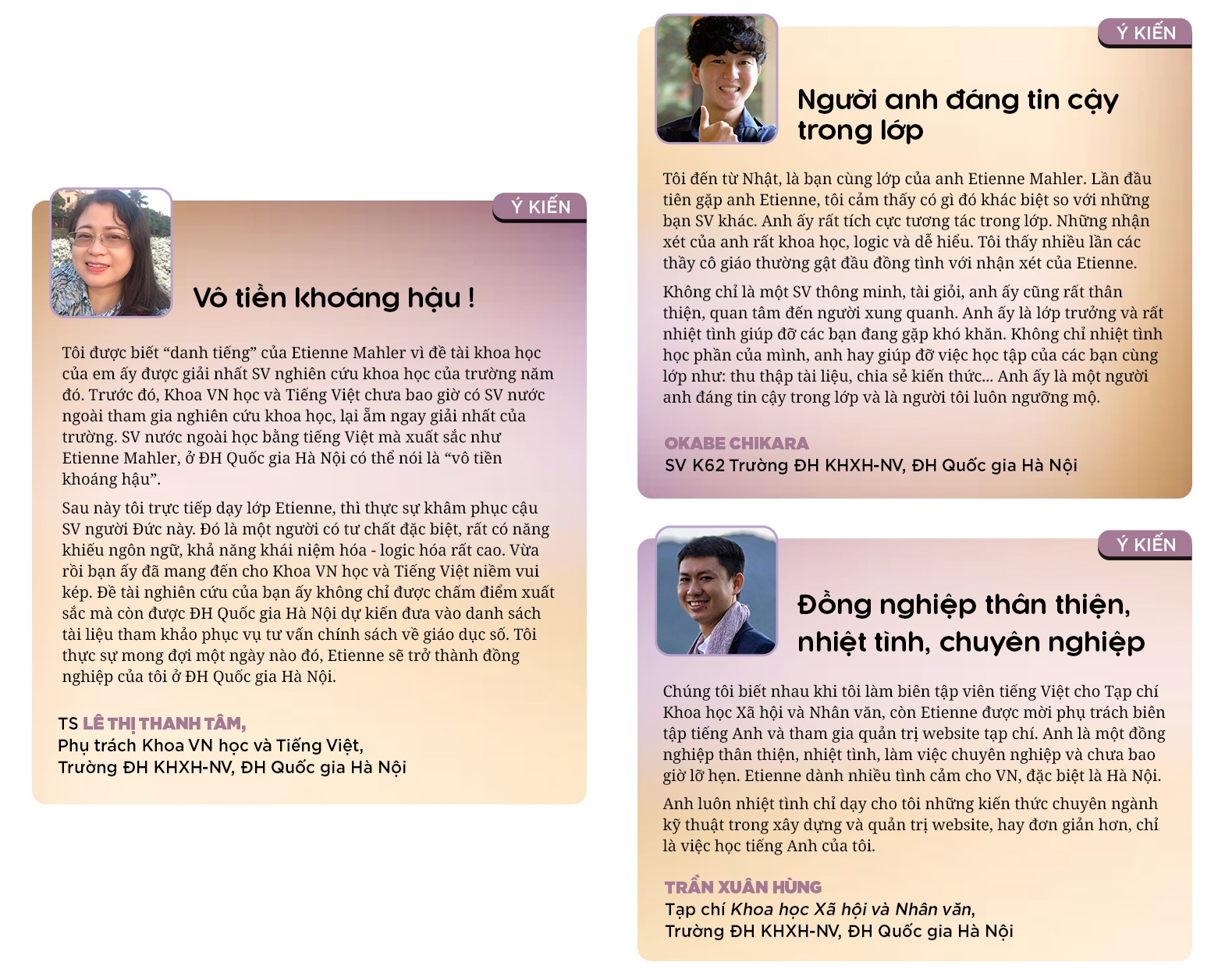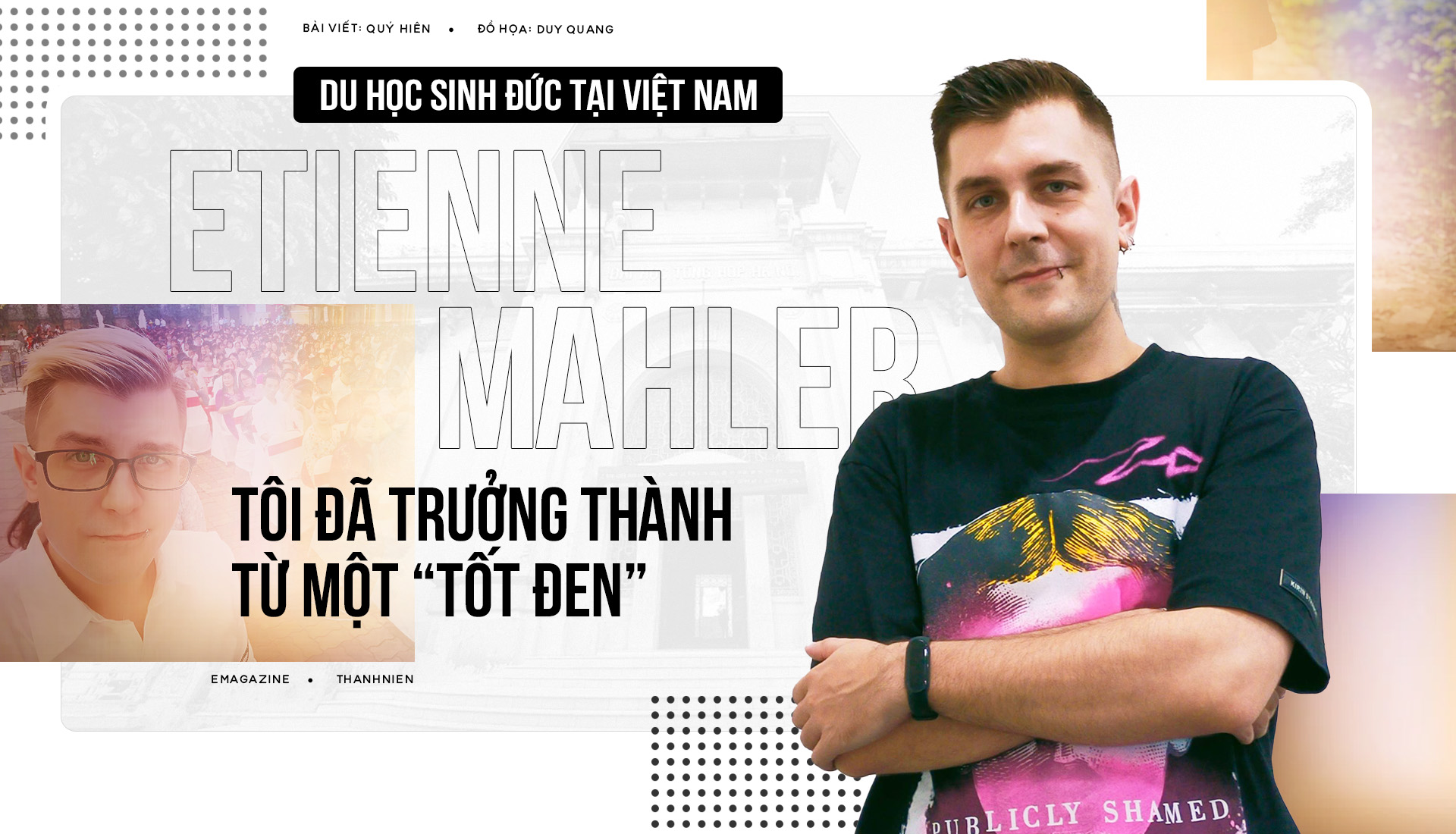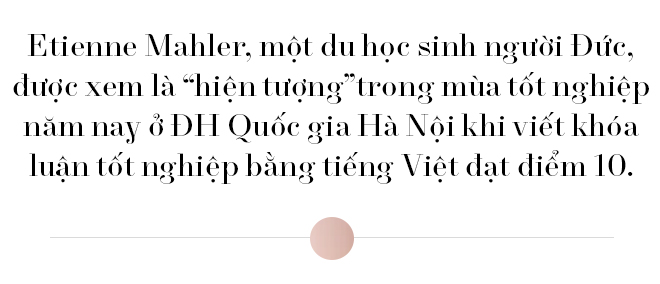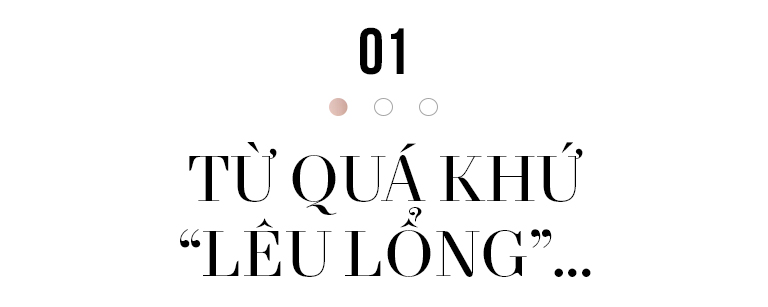Eight years ago, you were a student in Germany, studying anthropology and Chinese. But then you came to Vietnam and stayed to study Vietnamese Studies - Vietnamese Language. What happened?
In September 2014, I went to Vietnam as part of a student exchange program between the University of Göttingen and the University of Social Sciences and Humanities, Vietnam National University, Hanoi. At that time, I was a first-year student studying anthropology and Chinese at the University of Göttingen. The program was for six months, but I requested to stay for an additional year. After that year, I decided to drop out of my studies in Germany to stay in Vietnam and learn Vietnamese.
In 2017, at the age of 30, I was admitted to the Department of Vietnamese Studies and Vietnamese Language at the University of Social Sciences and Humanities and graduated from university at the age of 34.
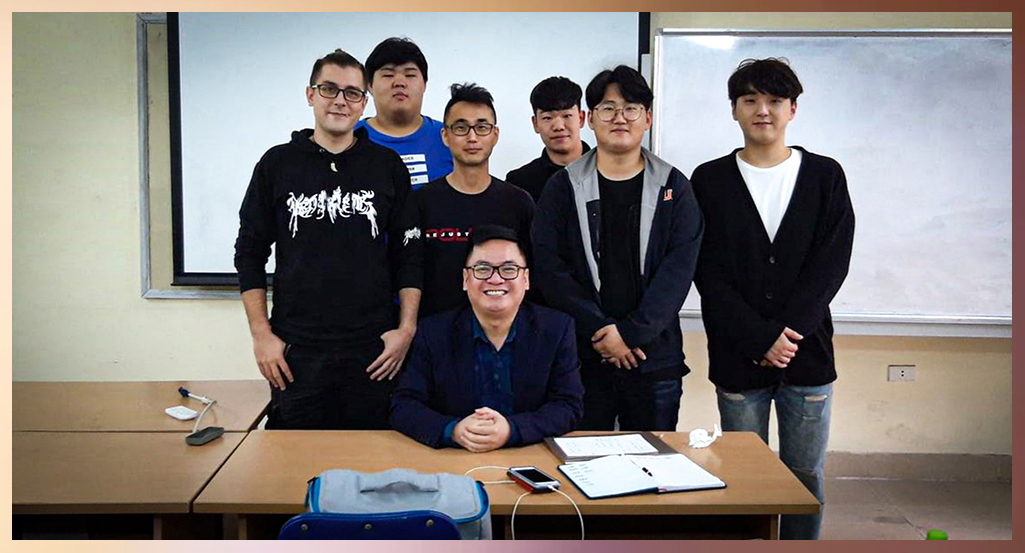
Etienne Mahler (far left) with some foreign students posing for a photo with Dr. Tran Bach Hieu, lecturer on Ho Chi Minh Thought - Photo: Thien Thanh
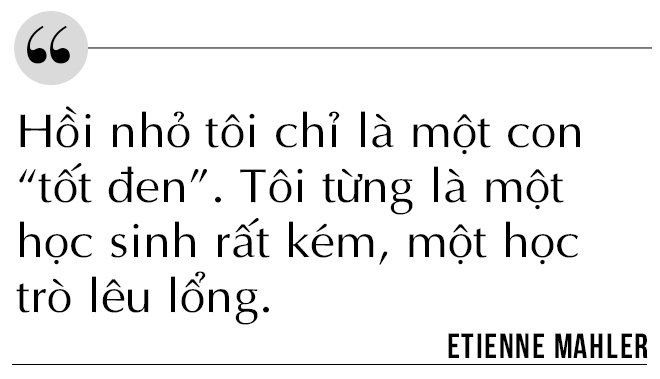
You started university (in Germany) when you were 26 years old? What about before that?
I used to be a somewhat rebellious student. When I started working at a hotel, I met some friends who said, "You're smart, why don't you try reading?" So I started reading my first books, in my twenties or twenties. Books opened up a different world for me; they made me want to explore and learn about life and the world.
That's why I felt I needed to go to university, and I graduated from high school with excellent grades (14.3/15). I was 26 years old that year.
What do you do to earn money?
According to German law, 14-year-olds are allowed to do some light work. But I started working a little earlier. My first job was handing out flyers, then washing cars. I even tried working as a supermarket clerk.
My parents divorced when I was only a few months old. I lived with my father, but our relationship wasn't very good. That's why I started working quite early. By the age of 17 or 18, I had a lot of money of my own and owned two cars.
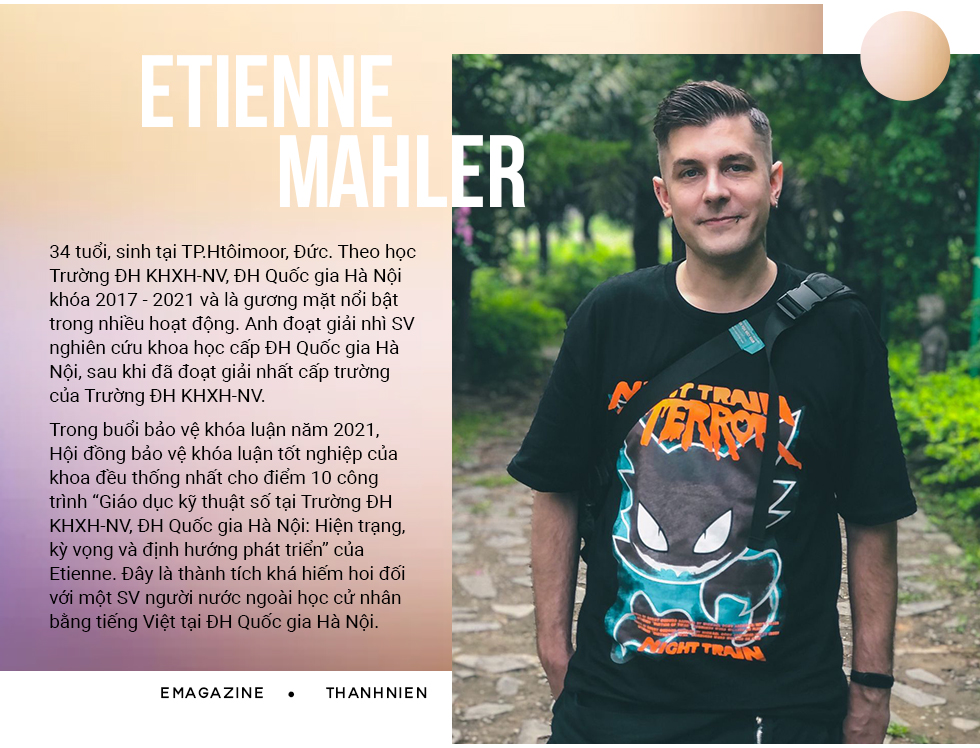
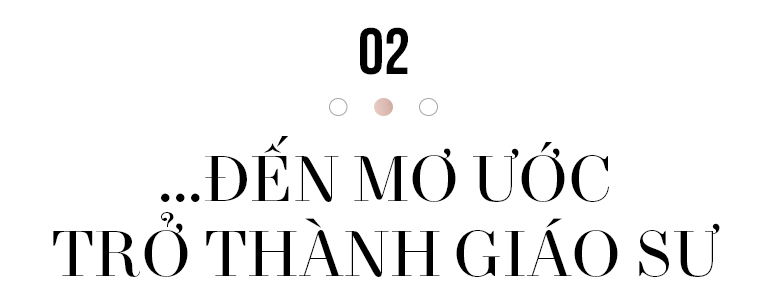

Let's go back to the story of starting university. You chose anthropology as your major, and you also studied Chinese. Why?
Back then, I simply enjoyed learning about cultures different from German culture, so I studied Chinese. When I came to Vietnam, I fell in love with it immediately. Now, I enjoy writing and research. So, I might become a journalist or a scientific researcher. I might even become a professor someday. But that's a long road. For now, I might pursue a master's degree, then a doctorate.
You dropped out of university in Germany to stay in Vietnam, learn Vietnamese, and then attend university in Vietnam. How did you start your life in Vietnam?
My first year in Vietnam was when I received a very good scholarship from the German government, about 30 million VND per month. It was for my undergraduate program, meaning my finances were fully covered throughout my university studies. When I decided to stay in Vietnam, I had to abandon the program.
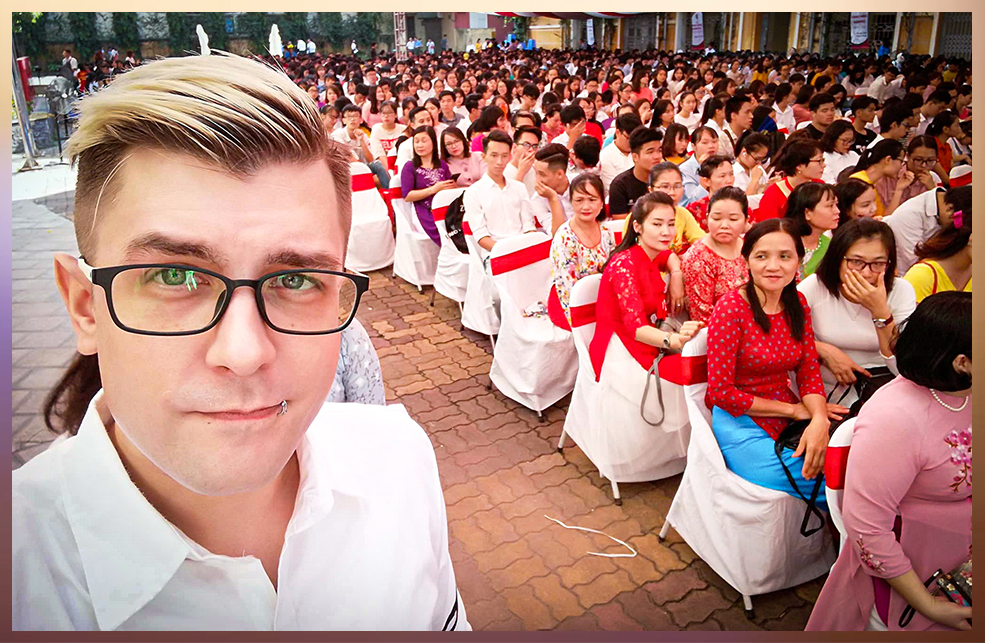
Etienne Mahler at a festival of Hanoi National University - Photo courtesy of the interviewee.
But as I mentioned above, I'm capable of earning money – I've been independent since I was young. When I was in Germany, I opened a small company specializing in website design (I taught myself website design 10 years ago). When I came to Vietnam, I maintained that company but worked online, with clients mainly in Germany and some other European countries.
Later, I also worked (as an English editor) for two scientific journals, one of the Vietnam Academy of Social Sciences and one of the University of Social Sciences and Humanities, and did some freelance work related to translation.
Going from a vibrant young German to a bookish, writing-loving individual who also works and earns money—do you find that difficult?
In Germany, my life was very hectic for a long time. Back then, I would go out as early as 11 pm, sometimes even 1 am, and wouldn't get home until 6 or 7 am. Now, I live a very structured life. Working 10-12 hours a day is normal for me.
I also realize that the changes in my life have been dramatic. But because I started from a low point, I had to work very hard to gain the ability and knowledge to do what I love.
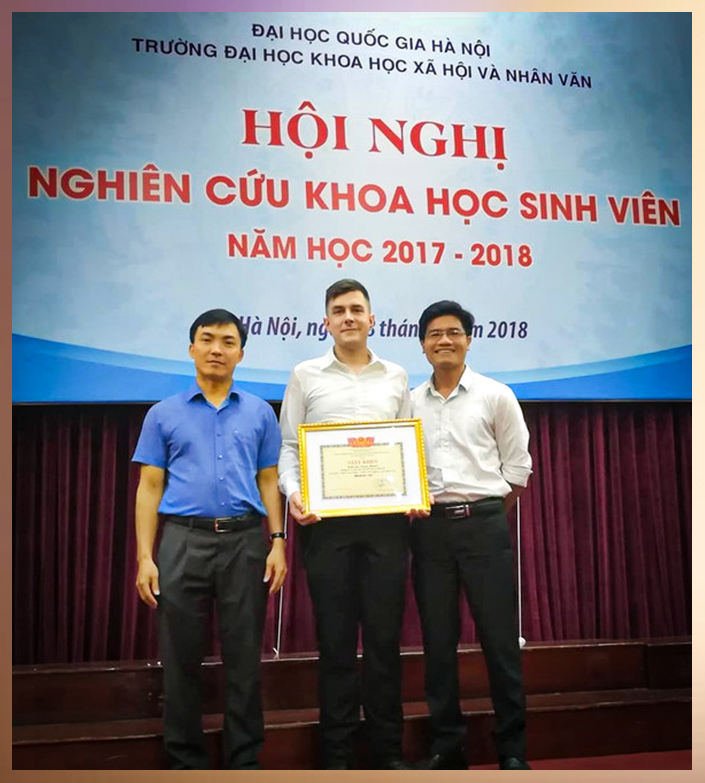
Etienne Mahler (center) receives the first prize in the student scientific research competition of the University of Social Sciences and Humanities, Vietnam National University, Hanoi - Photo: Thien Thanh
What aspect of Vietnamese culture fascinates you the most?
Initially, it was simply because it was a completely different culture from Germany. Then, I found it really interesting. Vietnamese people are very friendly. Vietnam started from a low economic base, but it has developed very rapidly in technology. For example, right now in Vietnam, you can use a 5G phone.
One example I find very interesting about Vietnamese culture is the issue of religion. In Germany, each person is limited to one religion, and people are usually quite strict about this. In Vietnam, however, it's much more relaxed. You can be Christian, but you can still have an ancestral altar in your home. Many religious practices, when viewed from the outside, seem incompatible, but in Vietnam, they're all accepted. I find this characteristic really fascinating.
When Vietnamese people think of Germany, they imagine a very developed, stable, and prosperous society. In reality, although Germany is wealthy, its socio-economic development is generally quite slow. Vietnam is different. I really enjoy seeing the significant progress in the Vietnamese families I know. I knew them when they were poor, and now they are much better off, and that's truly heartwarming.
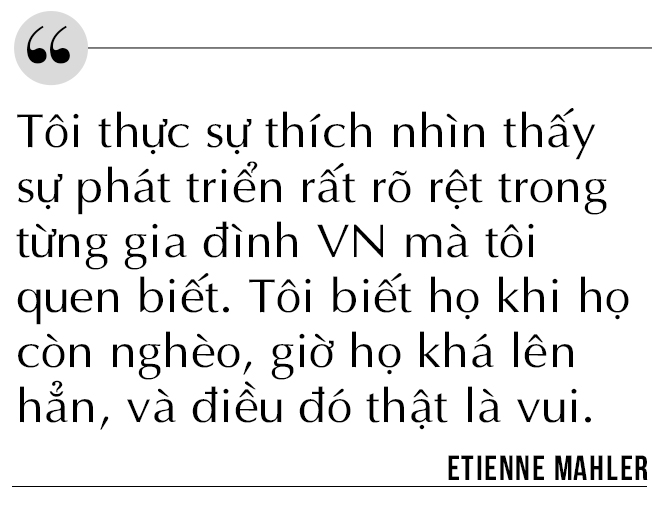
But there's one thing I've noticed: Germany and Vietnam are becoming closer, due to the reverse development from both sides. That is, parents in Germany are starting to take care of their children more. In the past, six-year-olds in Germany had to walk to school on their own. But nowadays, more and more parents are taking their children to school. This means that family culture in Germany is gradually changing. In Vietnam, the change is in the opposite direction; parents are less overprotective of their children.
I understand that although your graduation thesis was highly rated, you had little time for it?
I had initially chosen a different topic, but then realized it wasn't suitable, so I changed it to "Digital Education at the University of Social Sciences and Humanities, Vietnam National University, Hanoi: Current Status, Expectations, and Development Directions."
In about two months, I completed my thesis, consisting of four chapters and 127 pages, along with 600 pages of appendices (which were interviews I conducted with my research subjects). After finishing, two Vietnamese friends helped me proofread it. Before submitting, I asked my supervising professor for feedback. She said the writing wasn't wrong, but it was a bit strange, resembling Western writing, as if it still had the style of a foreigner writing Vietnamese. She asked if I wanted to make any revisions, but I asked to keep it as it was.
Were you surprised that your thesis received such high marks?
Throughout the process, I knew I was doing well. This is a topic I'm passionate about, it's useful, and has high practical application. But I was also surprised by how highly it was rated.
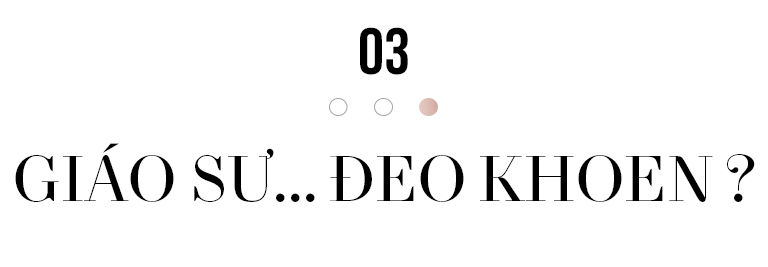

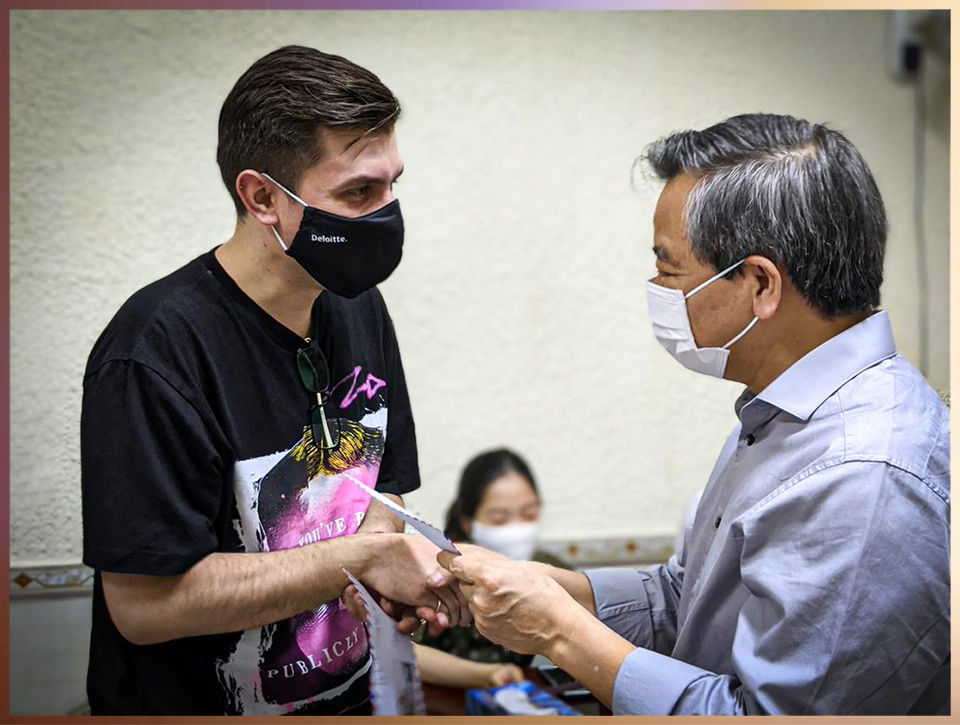
Etienne Mahler was congratulated by Professor Pham Quang Minh, former Rector of the University of Social Sciences and Humanities, Vietnam National University, Hanoi, on Vietnam Press Day 2021 (in his capacity as editor of the Journal of Social Sciences and Humanities) - Photo by Thien Thanh
You want to pursue a master's degree and then a doctorate, which means it will take another six years, until you're 40, before you can begin building a career in academia. Is that too late?
That's a great question. Eight years ago, when I was interviewing for a scholarship in Germany, they asked: Now that you're 26, do you know what you need to do? I answered: No!
I'm still the same, still on a journey of self-discovery. It's never too late. With what I have and what I'm experiencing, I feel like I'm living an interesting life. It helps me see that everything that's happening is wonderful. I don't live for the future, hoping it will be better. I focus on everything in the present and enjoy it. Of course, I still hope to be happy in the future, it's just that I'm not solely focused on that.
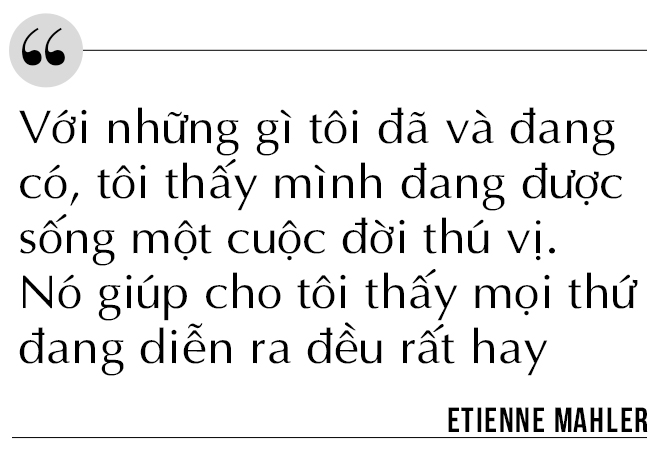
If you become a professor someday, will you be the first professor (at least in Vietnam) to wear piercings on your ears and lips? And have you considered that this would break the image of an intellectual that people usually imagine as having a dignified appearance?
Throughout my life, I've broken many stereotypes, and I'm amused that you mentioned it. I may not have dressed like a good student, but that didn't stop me from being a good student. How I dress and whether I do my job well are two different things. You mentioned that you started reading in your 20s or 21s. Do you remember what the first book you read was?
I only remember the first book I liked, after a number of books I didn't. It was Sophie's World by Jostein Gaarder, a Norwegian writer. The book tells the story of a young girl's journey to understand Western philosophy, with the help of an old philosopher. I was captivated by this book. Thanks to it, I later read many more books on philosophy.
Thank you, Etienne Mahler!
